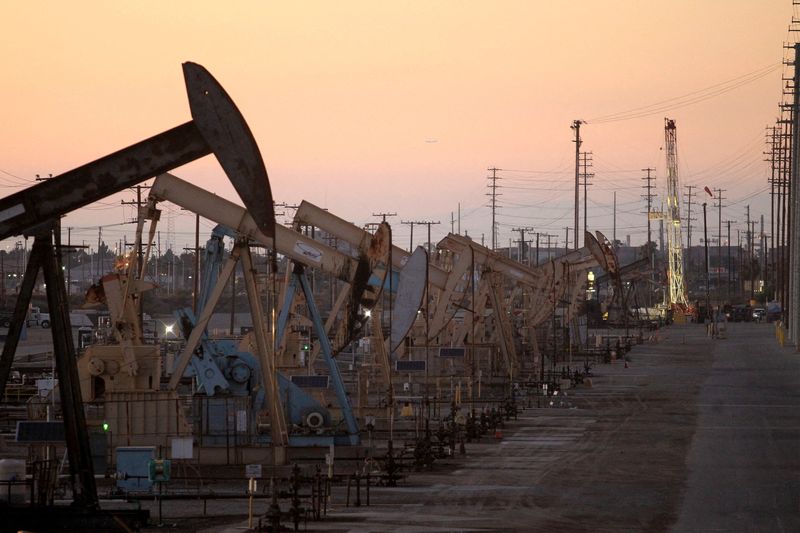
© Reuters. FILE PHOTO: Oil rig pumpjacks, also known as thirsty birds, extract crude from the Wilmington Field oil deposits area near Long Beach, California July 30, 2013. REUTERS/David McNew//File Photo
By Paul Carsten
LONDON (Reuters) -Oil prices rose on Tuesday as the market focused on uncertainty over a potential Gaza ceasefire and some expectations that producer group OPEC+ will extend voluntary supply cuts in March.
futures rose 50 cents, or 0.61%, to $83.03 a barrel by 1442 GMT. U.S. West Texas Intermediate crude futures (WTI) were up 60 cents, or 0.77%, at $78.18.
Mixed signals came from the Middle East as U.S. President Joe Biden said Israel is ready to halt its attacks on Gaza for the Muslim holy month of Ramadan in a ceasefire that could be signed as early as next week. But Hamas officials said Biden’s remarks were premature while it studies a truce offer.
Also supporting crude were comments from Yemen’s Houthi spokesperson, who said the group’s operations in the Red Sea will stop only when Israeli “aggression” against Gaza ends and the siege is lifted.
Houthi missile and drone attacks on international shipping have driven up the cost of transporting energy products and contributed to a tighter market.
“Concerns around shipping disruptions in the Red Sea have supported a rebound in the price of crude oil overnight,” said Tony Sycamore, an analyst at IG in Sydney.
Elsewhere, OPEC+ will make a decision in March on whether to extend voluntary production cuts to bolster prices.
“We expect OPEC+ to announce the rollover of voluntary production quotas, at least until the June Ministerial Meeting, to provide additional support,” Helima Croft, of RBC Capital Markets, said in a note late on Monday.
Meanwhile, there have been signs that Chinese oil demand could pick up and push prices higher.
“Concerns over Chinese demand are abating, as refineries continue brisk buying in the physical market after a boom in Lunar New Year travel,” ANZ Bank analysts said in a note.
Also on Tuesday, Russian authorities announced a six-month ban on gasoline exports from March 1 to compensate for rising demand and to allow for refinery maintenance.
Both oil benchmarks had settled more than 1% higher on Monday after declines of 2-3% over the previous week as markets factored in a greater likelihood that cuts to interest rates might take longer to come than previously expected.
Kansas City Federal Reserve Bank President Jeffrey Schmid on Monday signalled that he, like most of his central banking colleagues, is in no rush to cut rates. High borrowing costs typically reduce economic growth and oil demand.
The January U.S. personal consumption expenditures price index, the Fed’s preferred measure of inflation and a key factor in rate decisions, is due on Thursday.
The American Petroleum Institute industry group’s weekly inventories data is due to be released at 4:30 p.m. EST (2130 GMT).









